 Dirk’s
Comments
(group member since Feb 02, 2022)
Dirk’s
Comments
(group member since Feb 02, 2022)
Dirk’s
comments
from the Art Lovers part 3 group.
Showing 161-180 of 1,404
 Winslow Homer
Winslow Homer(1836 - 1910)
Winslow Homer. was an American landscape painter and illustrator, best known for his marine subjects. He is considered one of the foremost painters of 19th-century America and a preeminent figure in American art in general.
https://en.wikipedia.org/wiki/Winslow...

Snap the Whip
1872
Oil on canvas
56 x 91.4 cm
Butler Institute of American Art, Youngstown, Ohio
http://www.butlerart.com/pc_book/page...
Snap the Whip depicts a group of children playing crack the whip in a field in front of a small red schoolhouse. With more of America's population moving to cities, the portrait depicts the simplicity of rural agrarian life that Americans were beginning to leave behind in the post-Civil War era, evoking a mood of nostalgia. Homer painted a second version, of similar date, which is now in the Metropolitan Museum of Art, New York. In this, he retains the schoolhouse but the background hillscape is removed, making the location less regionally specific.

Snap the Whip
1872
Oil on canvas
61 x 81 cm
The MET
https://www.metmuseum.org/art/collect...
 Francisco Laso
Francisco Laso(1823 - 1869)
José Francisco Domingo Laso de la Vega y de los Ríos was a Peruvian painter and politician. During his lifetime he was mostly known for his portraits, but is now better known for creating works that were precursors to indigenismo in art.
https://en.wikipedia.org/wiki/Francis...
https://en.wikipedia.org/wiki/Indigen...
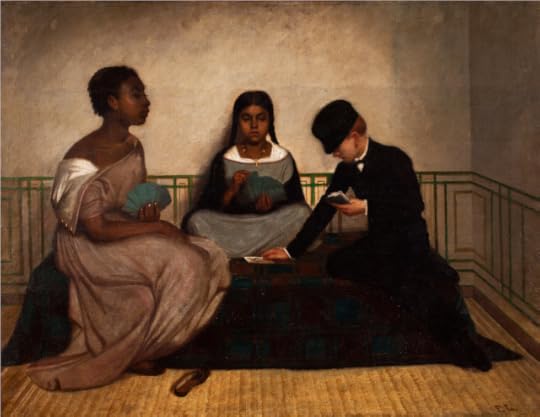
The Three Races or Equality before the Law
1859
Oil on canvas
105 x 81 cm
MALI, Museo de Arte de Lima, Peru
Three persons—of Indigenous, African, and European descent—sit around a table, quietly absorbed in a game of cards. Laso, a Peruvian painter known for his early explorations of national identity, presents this ordinary scene with a quietly radical message: shared space, shared rules, and shared attention suggest a vision of equality more intimate than idealized. The game is never named, but everyone is playing.
 Every month I choose a theme and try to post as many different artists as there are days.
I won’t reveal the theme right away—so for the first few days, you’re invited to play along and try to guess it. I think this one won’t be too hard to figure out. Let’s just say there’s a spirit of fun, competition, and maybe a little strategy involved this time.
Every month I choose a theme and try to post as many different artists as there are days.
I won’t reveal the theme right away—so for the first few days, you’re invited to play along and try to guess it. I think this one won’t be too hard to figure out. Let’s just say there’s a spirit of fun, competition, and maybe a little strategy involved this time.You’re welcome to comment on the pictures, respond to other people’s comments, or say whatever you like (as long as it follows the group rules, of course).
There’s just one rule for this thread: only the person running it can post pictures. So please don’t post a picture here. That’s all!
Enjoy!
 Giorgione
Giorgione(1477-78 - 1510)
Giorgio Barbarelli da Castelfranco known as Giorgione was an Italian painter of the Venetian school during the High Renaissance, who died in his thirties. He is known for the elusive poetic quality of his work, though only about six surviving paintings are firmly attributed to him. The uncertainty surrounding the identity and meaning of his work has made Giorgione one of the most mysterious figures in European art.
https://en.wikipedia.org/wiki/Giorgione
Possibly also:
Titian
(1477-78 - 1576)
Tiziano Vecellio (Titian), was an Italian Renaissance painter, the most important artist of Renaissance Venetian painting. He was born in Pieve di Cadore, near Belluno. During his lifetime he was often called da Cadore, 'from Cadore', taken from his native region.
https://en.wikipedia.org/wiki/Titian
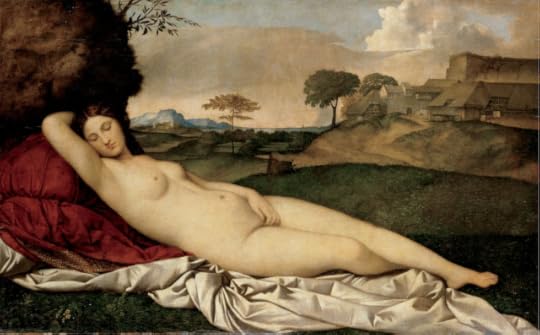
The Sleeping Venus (Italian: Venere dormiente)
1893
Lithograph
62.1 x 46 cm (sheet)
Gemäldegalerie Alte Meister, Dresden Germany
https://skd-online-collection.skd.mus...
The Sleeping Venus (Italian: Venere dormiente), also known as the Dresden Venus (Venere di Dresda), is a painting traditionally attributed to the Italian Renaissance painter Giorgione, although it has long been widely thought that Titian completed it after Giorgione's death in 1510. The landscape and sky are generally accepted to be mainly by Titian. In the 21st century, much scholarly opinion has shifted further, to see the nude figure of Venus as also painted by Titian, leaving Giorgione's contribution uncertain. It is in the Gemäldegalerie, Dresden. After World War II, the painting was briefly in possession of the Soviet Union.
en.wikipedia.org/wiki/Sleeping_Venus_...
 James Ward
James Ward (1769 - 1859)
James Ward RA was an English painter, particularly of animals, and an engraver. From 1810 or so onward, Ward specialised in painting horses within landscapes; slightly later, he turned to very large-scale landscapes, of which Gordale Scar (Tate, London), completed in 1814 or 1815 and depicting Gordale Scar (Yorkshire) as an example of the sublime, is considered his masterpiece and a masterpiece of English Romantic painting.
https://en.wikipedia.org/wiki/James_W...
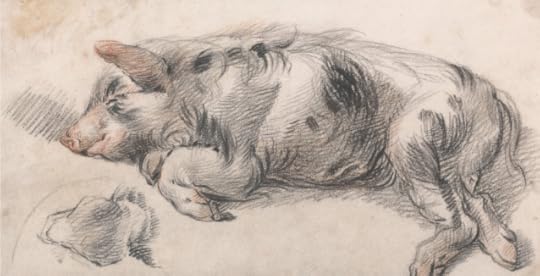
Sleeping Pig
Undated
Black and red chalk and graphite on medium, slightly, cream wove paper
14x 26 cm
Yale Center for British Art, New Haven, United States
https://collections.britishart.yale.e...
 Jules Bastien-Lepage
Jules Bastien-Lepage(1848 - 1884)
Jules Bastien-Lepage was a French painter closely associated with the beginning of naturalism, an artistic style that grew out of the Realist movement and paved the way for the development of impressionism. Émile Zola described Bastien-Lepage's work as "impressionism corrected, sweetened and adapted to the taste of the crowd."
https://en.wikipedia.org/wiki/Jules_B...

Les Foins (Hay making)
1877
oil on panel
195 x 160 cm.
Musée d'Orsay, Paris
https://www.artizon.museum/collection...
 Jean-Louis Forain
Jean-Louis Forain(1852 - 1931)
Jean-Louis Forain was a French Impressionist painter and printmaker, working in media including oils, watercolour, pastel, etching and lithograph. Compared to many of his Impressionist colleagues, he was more successful during his lifetime, but his reputation is now much less exalted.
https://en.wikipedia.org/wiki/Jean-Lo...
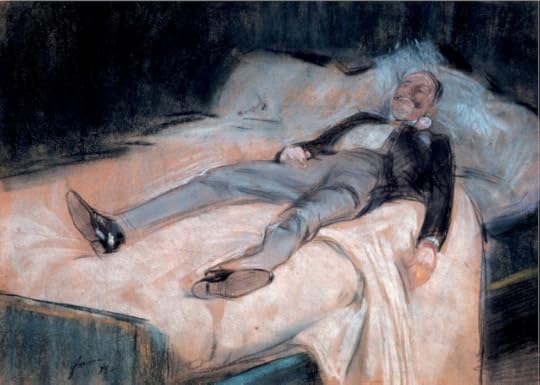
After the Ball, the Reveler
1882
Pastel on paper
31 x 47 cm
Dixon Gallery and Gardens, Memphis, US
http://collections.dixon.org/objects/...
 Odilon Redon
Odilon Redon(1840 - 1916)
Odilon Redon was a French Symbolist draftsman, printmaker, and painter. Redon is perhaps best known today for the dreamlike paintings created in the first decade of the 20th century, which were inspired by Japanese art and leaned toward abstraction. His work is considered a precursor to Surrealism.
https://en.wikipedia.org/wiki/Odilon_...
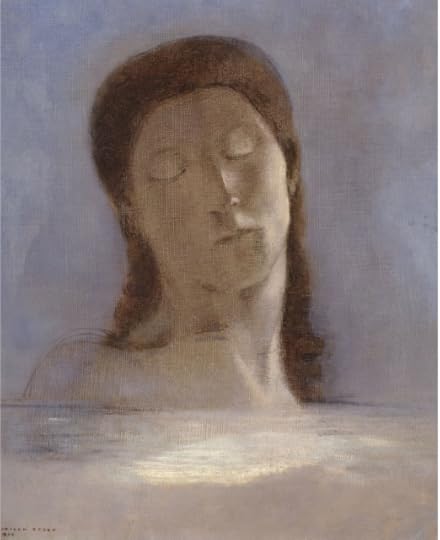
Les Yeux clos (Closed Eyes)
1890
Oil on canvas mounted on cardboard
44 x 36 cm
Musee d’Orsay, Paris
https://www.musee-orsay.fr/en/artwork...
 François Boucher
François Boucher(1703- 1770)
François Boucher was a French painter, draughtsman and etcher, who worked in the Rococo style. Boucher is known for his idyllic and voluptuous paintings on classical themes, decorative allegories, and pastoral scenes. He was perhaps the most celebrated painter and decorative artist of the 18th century.
https://en.wikipedia.org/wiki/Françoi...
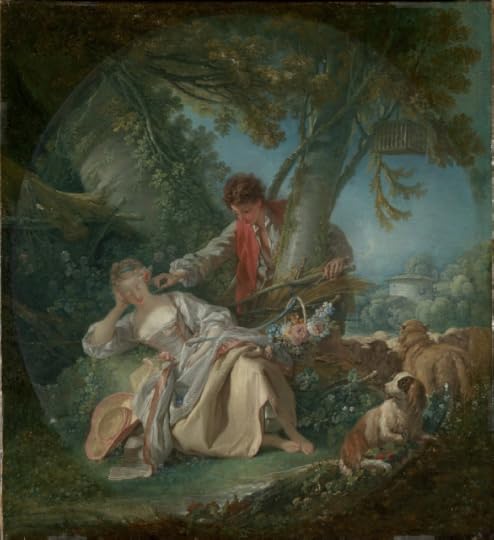
The Interrupted Sleep
C. 1750
Oil on canvas
81.9 x 75.2 cm
The MET
https://www.metmuseum.org/art/collect...
 Samuel Palmer
Samuel Palmer(1805- 1881)
Samuel Palmer RWS Hon.RE was a British landscape painter, etcher and printmaker. He was also a prolific writer. Palmer was a key figure in Romanticism in Britain and produced visionary pastoral paintings.
https://en.wikipedia.org/wiki/Samuel_...
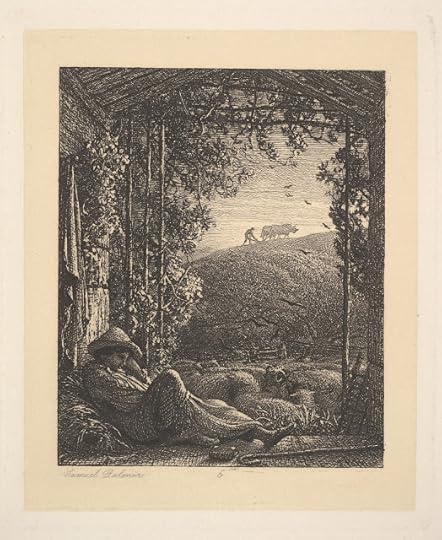
The Sleeping Shepherd, Early Morning
1857
Etching on chine collé; fourth state of four
plate: 12.5 x 10.2 cm, sheet: 34 x 24 cm
The MET
https://www.metmuseum.org/art/collect...
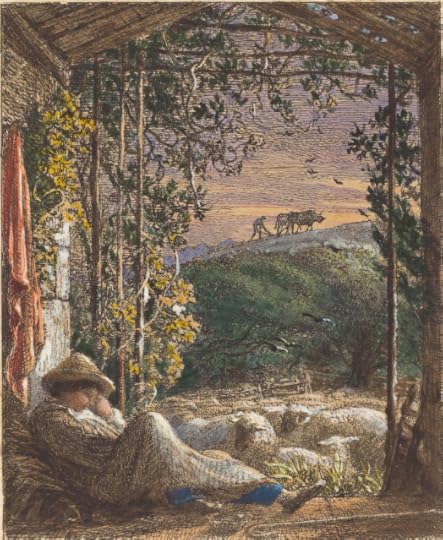
Colored version
National Gallery, Washington, DC
https://www.nga.gov/collection/art-ob...
 Stanisław Wyspiański
Stanisław Wyspiański(1869- 1907)
Stanisław Mateusz Ignacy Wyspiański was a Polish playwright, painter, poet, and interior and furniture designer. A patriotic writer, he created symbolic national dramas accordant with the artistic premises of the Young Poland movement.
https://en.wikipedia.org/wiki/Stanisł...

Sleeping Mietek
1902
Pastel on paper
64 x 47 cm
The National Museum in Krakow, Poland
https://mnp.art.pl/pl/project/mietek-...
 Luigi Di Giovanni
Luigi Di Giovanni(1856 - 1938)
Luigi Di Giovanni was born in Palermo in 1856. His first apprenticeship was with his father Giuseppe, a painter and engraver well-known in the artistic circles of the city, with whom he frescoed numerous buildings in Palermo.
During his stay in Naples from 1873 to 1882 he was a student of Domenico Morelli, to whose teaching some works of historical subjects are linked. He is known above all for many oil paintings, watercolors and pastels, depicting genre subjects such as Sicilian women in folk costume or views of strong realistic rendering.
Di Giovanni returned to Palermo in 1882 and in 1886 obtained the chair of figure painting at the Academy of Fine Arts in Palermo, where he taught for forty years, in addition to creating a very popular pastel school.
He collaborated on the decorations of the Teatro Politeama and the Teatro Massimo with Ettore De Maria Bergler and Michele Cortegiani. He died in Palermo in 1938.
https://museo.messina.it/autore/luigi...
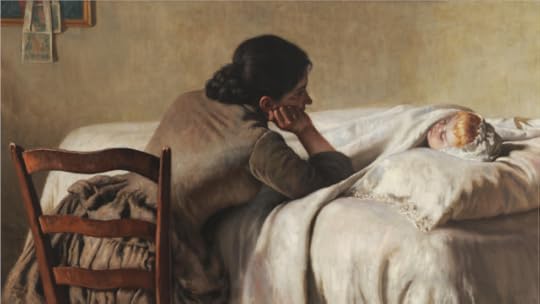
A Mother Watching Over Her Child
1890
Oil on canvas
84.5 x 191 cm.
Gallery of Modern Art "Empedocle Restivo”, Palermo, Italy
https://artsandculture.google.com/ass...
 Strozzi Bernardo
Strozzi Bernardo (1581/82–1644)
Bernardo Strozzi, named il Cappuccino and il Prete Genovese, was an Italian Baroque painter and engraver. A canvas and fresco artist, his wide subject range included history, allegorical, genre and portrait paintings as well as still lifes. Born and initially mainly active in Genoa, he worked in Venice in the latter part of his career. His work exercised considerable influence on artistic developments in both cities. He is considered a principal founder of the Baroque style in Venetian painting. His powerful art stands out by its rich and glowing colour and broad, energetic brushstrokes.
https://en.wikipedia.org/wiki/Bernard...
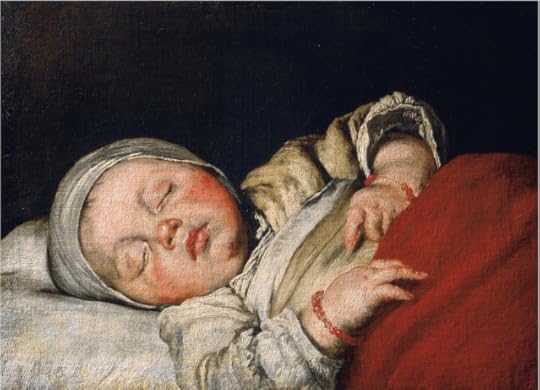
Sleeping Child
1581/82–1644
Oil on canvas
47.6 x 34.5 cm
DomQuartier, Salzburg
https://artsandculture.google.com/ass...
 Evelyn De Morgan
Evelyn De Morgan(1855 - 1919)
Evelyn De Morgan was an English painter associated early in her career with the later phase of the Pre-Raphaelite Movement, and working in a range of styles including Aestheticism and Symbolism. Her paintings are figural, foregrounding the female body through the use of spiritual, mythological, and allegorical themes. They rely on a range of metaphors (such as light and darkness, transformation, and bondage) to express what several scholars have identified as spiritualist and feminist content. Her later works also dealt with the themes of war from a pacifist perspective, engaging with conflicts such as the Second Boer War and World War I.
https://en.wikipedia.org/wiki/Evelyn_...
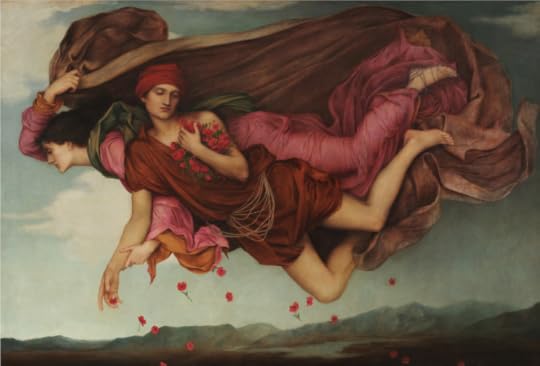
Night and Sleep
1878
Oil on canvas 42 x 62 cm.
De Morgan Centre, Cannon Hall, Cawthorne, UK
https://www.demorgan.org.uk/collectio...
One of the first ever female pupils at London's Slade School, she has littered this work with hidden feminist symbolism. Whilst the scene depicts the arrival of sleep it can also be interpreted as "entering an new dawn, where the figure will awake to a world of equal gender rights, ready, like de Morgan, to make their mark.
 Charles Bargue
Charles Bargue1825/26–1883
Charles Bargue was a French painter and lithographer noted for devising an influential drawing course.
https://en.wikipedia.org/wiki/Charles...
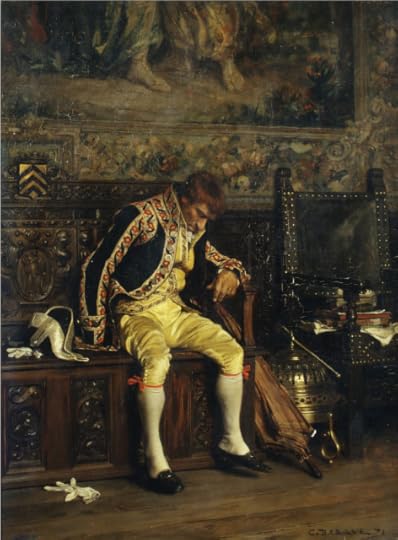
A Footman Sleeping
1871
Oil on wood
34.9 x 26 cm
The MET
https://www.metmuseum.org/art/collect...
 Frans Rijckhals
Frans Rijckhals(1609 - 1647)
Frans Rijckhals, or François Ryckhals was a Dutch painter and designer. His works combine genre scenes with still-lifes.
https://en.wikipedia.org/wiki/Frans_R...
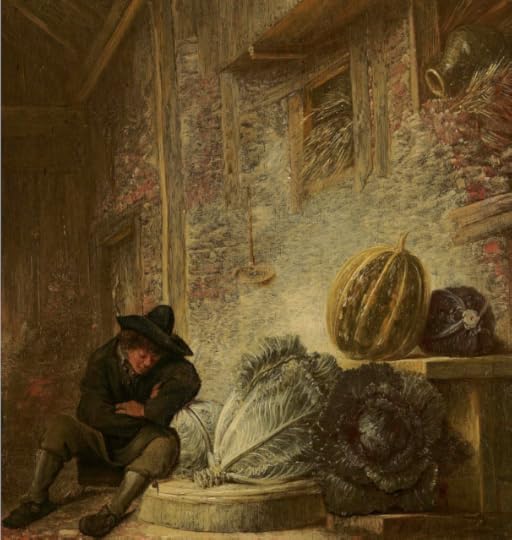
Boy Sleeping in a Barn
c. 1640-1643
Oil on panel
36.4 x 32.5 cm
The Mauritshuis, Den Haag, Netherlands
https://www.mauritshuis.nl/en/our-col...
 Diego Rivera
Diego Rivera(1886 - 1957)
Diego Rivera was a Mexican painter. His large frescoes helped establish the mural movement in Mexican and international art. Between 1922 and 1953, Rivera painted murals in, among other places, Mexico City, Chapingo, and Cuernavaca, Mexico; and San Francisco, Detroit, and New York City. In 1931, a retrospective exhibition of his works was held at the Museum of Modern Art in Manhattan, New York. That was before he completed his 27-mural series known as Detroit Industry Murals.
https://en.wikipedia.org/wiki/Diego_R...
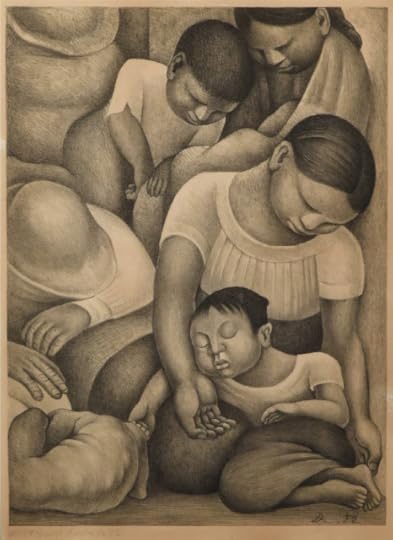
Sueño (Sleep)
1932
Lithograph
30 x 41.3 cm.
MoMA
https://www.moma.org/collection/works...
 Vincenzo Irolli
Vincenzo Irolli(1860- 1949)
Vincenzo Irolli was an Italian painter born in Naples, then in the Kingdom of the Two Sicilies. He enrolled in the Naples Institute of Fine Arts, where his masters included Gioacchino Toma, in 1877 and graduated three years later. The work he presented regularly at the exhibitions of the Naples Società Promotrice di Belle Arti as from 1879 comprised portraits and genre scenes. In 1884 in Turin, he exhibited Amore e dovere and Le Maddalene d' oggi; in 1880 in Milan and in 1887 in Venice, he exhibited numerous drawings from reality.
https://en.wikipedia.org/wiki/Vincenz...
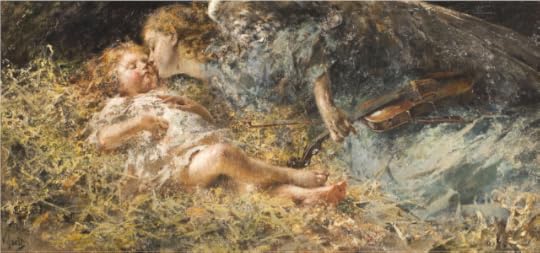
The Angel Musician
1900-1905
Oil on canvas
191 x 89.5 cm
Fondazione Cariplo, Milano
https://gallerieditalia.com/en/online...#
 Eva Gonzalès
Eva Gonzalès(1849 - 1883)
Eva Gonzalès was a French Impressionist painter. She was one of the four most notable female Impressionists in the nineteenth century, along with Mary Cassatt (1844–1926), Berthe Morisot (1841–95), and Marie Bracquemond (1840–1916).
https://en.wikipedia.org/wiki/Eva_Gon...
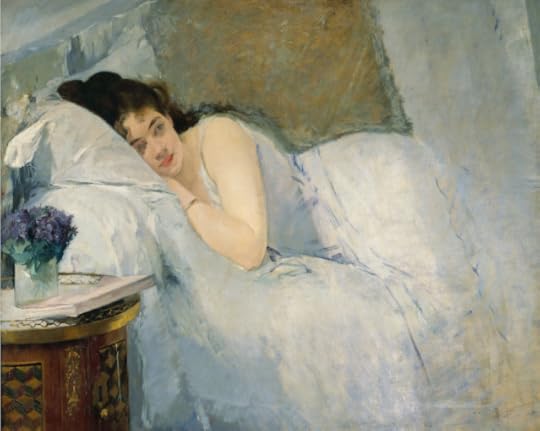
Girl Awakening`
c. 1877/78
Oil on canvas
81 x 100 cm
Kunsthalle Bremen
https://onlinekatalog.kunsthalle-brem...
 Candido Portinari
Candido Portinari(1903 - 1962)
Candido Portinari was a Brazilian painter. He is considered one of the most important Brazilian painters as well as a prominent and influential practitioner of the neo-realism style in painting.
https://en.wikipedia.org/wiki/Candido...
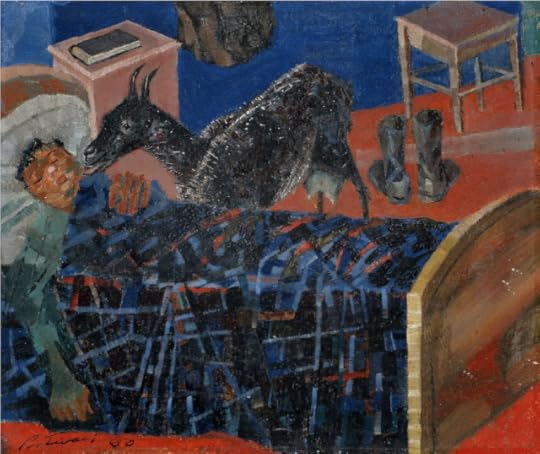
Boy Sleeping
1960
Oil on canvas
20 cm × 17 cm
Projeto Portinari, Rio de Janeiro, Brazil
https://www.portinari.org.br/en/archi...

